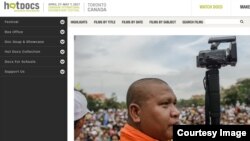Land grabbing has sparked regular protests in Cambodia over the past two decades and is the focus of a new documentary film, “A Cambodian Spring”, by filmmaker Chris Kelly.
Kelly spent about six years in Cambodia producing the film, which follows several land activists, including Venerable Loun Sovath, Tol Srey Pov, and Tep Vanny, as they grapple with authorities intent on displacing impoverished Cambodians from their land.
“One of the problem in Cambodia is that the land in Phnom Penh is extremely valuable per square meter,” Kelly said. “So these people who bought the land back in 1981, they now own land that is extremely valuable and wanted by the developers, so it is very difficult for them to find a satisfactory solution when the developer doesn’t treat them with any kind of respect.”
Sovath, a central figure in the film, played an active role in documenting protests against land grabbing, as well as teaching human rights and Buddhist practices to land grab victims.
“They stopped us from driving, but we are happy to walk,” he says in the film, while leading a group of villagers to attend a hearing at a court in Siem Reap province. “If we walk 10 kilometers, we’ll get to the national road. But I don’t think any taxis will dare to take us.”
Sovath and other activists in the film faced constant harassment while filming protests and the trial of 10 Boeung Kak lake activists and was briefly detained by authorities and banned from temples.
“The Supreme Patriarch Noun Ngeth has issued a letter evicting me from here, and banning me from all other pagodas,” he says.
“The Supreme Patriarch is not pleased that I share in the misery of the people, who are victims of land grabbing and forced evictions, when they have been injured, disabled or thrown in jail. If a pagoda doesn’t adhere to Buddhist principles, then its Supreme Patriarch and religious officials don’t abide by Buddhist principles either. Then it is not a real pagoda, and they are not leaders who will guide our religion to prosperity,” he adds.
Some 700,000 people are thought to have been affected by land grabs since 2000, according to rights groups. Many have been forcibly evicted from their homes without proper compensation and some have faced imprisonment.
Some evictees continue to live in poor conditions at relocation centers outside the capital and face diseases and food shortages.
Yet others, such as Srey Pov of the Boeung Kak community, have defied orders to move.
“We didn’t get our land title certificates,” she says. “Instead we were notified that the government would lease our land to the Shukaku Inc. company. The company has started to fill the lake with sand, flooding our streets, and causing three people to die from electrocution.”
Tep Vanny, who has become a household name in Phnom Penh over her opposition to the eviction and frequent run-ins with law enforcement, said the activists do not “disagree with the idea of development”.
“But the government should talk to us and help us settle the challenges the Boeung Kak people are facing. If we can get justice and transparency, it would be a win-win-win policy.”
“A Cambodian Spring” follows the transformation of women victims of land grabs, since 2008, into land activists.
“What they really wanted to do was to make sure that they were gonna be able to stay in their home,” said Kelly. “Or that they will be given adequate compensation for their home that would be at the correct market value so that they would be able to buy a new home somewhere else in Phnom Penh. They always said that they weren’t against development, but it should be inclusive and that shouldn’t be so destructive.”
Their years of street protests partly paid off. In 2011, the government decided to set apart 12.44 hectares of land for their homes.
“This is what we call democracy,” said Phnom Penh governor Kep Chutema, at a ceremony to hand over land certificates. “We do not fight in the streets. As Prime Minister Hun Sen has said, again and again, it is no longer fashionable to solve our problems with violence. But let me be clear. Don’t think that the World Bank will help you. They will not.”
Some of the women continue to protest as not all have received compensation.
Sovath continues to document the protests, despite threats and hindrances, while Vanny is now in jail for her continued protest.
“A Cambodian Spring” premiered on May 3 at the Hot Docs Canadian International Documentary Festival in Toronto, Canada.







